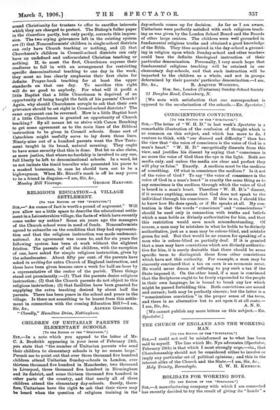CONSCIENTIOUS CONVICTIONS.
[To TEN EDITOR OF THE " SPECTATOR"' SIE,—The letter of "W. H. D." in last week's Spectator is a remarkable illustration of the confusion of thought which is so common on this subject, and which has more to do, I venture to think, with "our discord and difficulty" than has the view that "the voice of conscience is the voice of God in a man's heart." "W. H. D." energetically dissents from this view, and justifies his dissent by saying that "conscience is no more the voice of God than the eye is the light. Both are media only, and unless the media are clear and perfect they will play us false." Exactly. A medium must be the medium of something. Of what is conscience the medium ? Is it not of the voice of God ? To say "the voice of conscience is the voice of God in a man's heart" is exactly the same thing as to say conscience is the medium through which the voice of God is heard in a man's heart. Therefore "W. H. D.'s " dissent, if it means anything, means that God does not speak to the individual through his conscience. If this is so, I should like to know how He does speak, or if He speaks at all. My con- tention is that the words " conscience " and " conscientious " should be used only in connection with truths and beliefs which a man holds as divinely authoritative for him, and that this restriction would save much misunderstanding. Of course, a man may be mistaken in what he holds to be divinely authoritative, just as a man may be colour-blind, and mistake green for red. But that would be no reason for speaking of a man who is colour-blind as partially deaf. If it is granted that a man may have convictions which are divinely authorita- tive for him, it is surely desirable that there should be some specific term to distinguish these from other convictions which have not this authority. For example, a man may be sincerely convinced that a tax on corn is an economic error. He would never dream of refusing to pay such a tax if the State imposed it. On the other hand, if a man is convinced that the Scriptures ought to be freely expounded to the people in their own language, he is bound to break any law which might be passed forbidding this. Both convictions are sound and correct; both may be perfectly sincere; but the latter is a "conscientious conviction" in the proper sense of the term, and there is no alternative but to act upon it at all costs.— I am, Sir, &c., A. N. B. [We cannot publish any more letters on this subject.—En. Spectator.]














































 Previous page
Previous page